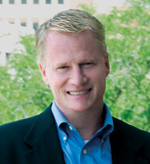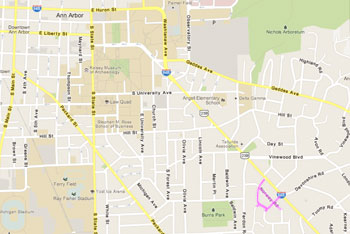This lil guy [Recycle Ann Arbor collection truck] was only a smidge bigger than a 15-passenger van! [photo]
Archive for January, 2013
Ann Arbor Budget Process Starts Up
A short meeting of the Ann Arbor city council’s budget committee – just before the full council’s Jan. 22 session – resulted in a consensus on an approach to budget planning for the next two-year cycle.

The Ann Arbor city council is beginning a budget planning process that should culminate in a council vote to adopt a fiscal year 2014 budget at its second meeting in May, which falls this year on May 20, 2013.
City administrator Steve Powers and chief financial officer Tom Crawford sketched out three kinds of topics they could explore with the full council at work sessions through the spring: (1) funding for items in the capital improvements plan (CIP); (2) budget impact analysis, broken down by service unit; and (3) additional resources required to support the city council’s five priority areas, which were identified in a planning session late last year.
The top three priority areas are: (1) city budget and fiscal discipline; (2) public safety; and (3) infrastructure. Two additional areas were drawn from a raft of other possible issues as those to which the council wanted to devote time and energy over the next two years: (4) economic development; and (5) affordable housing.
Possible city council work session dates are the second and fourth Mondays of the month. Regular meetings fall on the first and third Mondays.
The city council will be adopting a final budget for fiscal year 2014 by its second meeting in May. FY 2014 starts on July 1, 2013. Although the council approves an annual budget for the next fiscal year, the city uses a two-year planning cycle. This year starts a new two-year cycle, the first complete one for city administrator Steve Powers, who started the job about a year and a half ago, in September of 2011.
During some back-and-forth with the budget committee about the staff’s ability to provide all the information to the council that the committee had been describing – within the timeframe of the budget season – Powers joked: “Tom and I aren’t rookies!” Powers was previously Marquette County administrator for 16 years. Crawford has served as Ann Arbor’s CFO for more than eight years.
The council’s five-member budget committee consists of: Sabra Briere (Ward 1), Jane Lumm (Ward 2), Christopher Taylor (Ward 3), Marcia Higgins (Ward 4) and Mike Anglin (Ward 5).
An interesting wrinkle that emerged during the budget committee’s discussion was the role to be played by the city council in shaping the capital improvements plan (CIP). In response to some interest expressed by committee members to amend the CIP, Powers encouraged them to think in terms of allocating funds (or not) for elements of the plan. That’s because the content of the CIP is the statutory responsibility of the planning commission, not of the city council. The city council’s role is to determine which projects should be funded, Powers explained. But it’s for the city planning commission to finalize the content of the CIP itself.
This report includes more on the Michigan Planning Enabling Act (Act 33 of 2008) and the city council’s recent history of amending the CIP. [Full Story]
7th & Willow
Traffic at standstill as cars can’t get up hills coated with ice. [photo]
County Board to Revisit Right-to-Work Issue
Washtenaw County commissioner Andy LaBarre intends to bring forward a resolution at the county board’s Feb. 6, 2013 meeting related to Michigan’s new right-to-work legislation – including direction to renegotiate union contracts. He emailed a copy of his resolution to fellow commissioners and the media on Jan. 30. [.pdf of LaBarre's resolution]
In addition to formally condemning the right-to-work law and urging the state legislature to pass SB 95 and SB 96 – bills that would repeal the law – LaBarre’s resolution also “directs the County Administrator and the Director of Human Resources to engage in expedited negotiations, as requested by the Unions, with the goal of reaching four (4) year agreements to protect and extend each bargaining unit’s union … [Full Story]
Public Speaks Out On Apartment Projects
Ann Arbor planning commission meeting (Jan. 15, 2013): More than 35 people spoke during various public hearings at the most recent planning commission meeting, but most were on hand to protest a student housing development proposed for the northeast corner of Huron and Division.
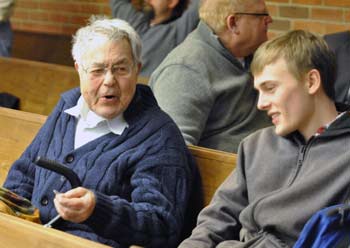
From left: Chuck Gelman and Scott Reed at the Ann Arbor planning commission’s Jan. 15, 2013 meeting. Gelman, founder of the former Gelman Sciences Inc., lives in Sloan Plaza and opposes the adjacent proposed development at 413 E. Huron. In contrast, Reed believes the residential project is “desperately needed.” (Photos by the writer.)
Following a public hearing that included some emotional pleas to halt the project, planning commissioners voted to postpone action on a site plan for 413 E. Huron, a 14-story residential development geared to university students. City planning staff had recommended postponement because input on the project hadn’t yet been received from the Michigan Dept. of Transportation, which must weigh in because of the building’s location along a state trunkline – Huron Street.
The design came under harsh criticism during the Jan. 15 public hearing, with some residents – including several from the adjacent Sloan Plaza – calling it a “behemoth,” a “folly” and a “massive student warehouse.” Several people criticized the developer for not being sufficiently responsive to concerns raised by the city’s design review board or feedback from residents.
Planning staff indicated that the item could be on the commission’s next regular meeting agenda, on Feb. 5. When commissioner Eric Mahler noted that the public hearing would continue, someone from the audience called out, “We’ll be back!”
Another 14-story student apartment building – at 614 Church St., on the Pizza House property – was also on the Jan. 15 agenda, and ultimately received a recommendation of approval from commissioners. That decision came despite objections from representatives of the adjacent Zaragon Place apartments at 619 E. University.
Concerns were raised about how Zaragon residents will be impacted by construction at 624 Church. Zaragon opened a few years ago and is marketed to University of Michigan students. The developers of 624 Church intend to market their apartments to the same demographic. Larry Deitch, an attorney who also serves as a UM regent, was on hand to represent the Zaragon owners. He said they didn’t object to the project itself, but were concerned about safety related to the use of a crane during construction, among other issues.
Planning staff indicated that the issues raised by Deitch and other Zaragon representatives would be handled at the building permit stage. The planning commission was being asked to address planning and zoning requirements, and the project was in conformance with those regulations.
In discussing the project, Mahler pointed out that the city had gone through a “robust” discussion about zoning as part of the A2D2 process, and had decided that this area should be zoned D1. Now that D1 projects are coming forward, “we need to get used to that,” he said.
Commissioners dealt with two other items on the Jan. 15 agenda. They recommended approval of the site plan and rezoning for a retail development at 3600 Plymouth Road, just west of US-23 – called The Shoppes at 3600. The project had previously been postponed by the commission on Nov. 7, 2012.
Another item moving forward is a request for annexation of 2925 Devonshire Road, one of several Ann Arbor Township “islands” within the city. Commissioners also recommended approval to zone the 0.66-acre site as R1A (single-family dwelling district). The item prompted a brief discussion about the need for better communication with Ann Arbor Township officials. [Full Story]
N. Main near Argo Dam
Always a lucky day when trains cross over one another. We need a pedestrian crossing here! [photo]
A2: Courts
The Detroit Free Press reports that former Michigan Supreme Court Justice Diane Hathaway pleaded guilty to felony bank fraud during a Jan. 29 hearing at the U.S District Court in downtown Ann Arbor. Eastern District Court Judge John Corbett O’Meara is handling the case. From the report: “Hathaway was charged Jan. 18 with one count of bank fraud after investigators said she moved ownership of property in Florida to relatives so she could qualify for the short sale. Hathaway allegedly told financial institution ING Direct she could no longer afford the house payments on the Michigan home.” [Source]
Federal Bldg, E. Liberty
TV channels 4/5/7, Homeland Security and two white police vans. Former Michigan Supreme Court Justice Diane Hathaway’s trial.
UM: Sustainability
The University of Michigan has released its 2012 Sustainability Progress Report in an interactive online format, with information related to academics, research and operations on sustainability. The report includes video interviews, a photo gallery and a wide range of data on UM’s efforts. [Source]
Ann Arbor Taxicab Board Grants Appeal
Ann Arbor city taxicab board meeting (Jan. 24, 2013): The taxicab board’s agenda included two main items: (1) an appeal from a driver who’d been denied a taxicab license when he applied last year; and (2) scheduling of future meetings.

Taxi stand sign on State Street in front of the Michigan Union. From the city’s taxicab ordinance: “Only licensed taxicabs are permitted to park on the taxicab stand.”
The driver’s application had been denied by the city based on the fact that he currently has 7 points on his license – stemming from a right-on-red violation and a speeding violation. The city’s ordinance stipulates that a license to operate a taxicab doesn’t have to be granted if an applicant has more than 6 points on their license. The board quizzed the prospective driver about past traffic infractions and his intentions for future employment, before deciding to grant his appeal.
The outcome of the board’s discussion on meeting time led to a decision to fix its regular meeting time for the fourth Thursday of the month at 5:30 p.m. That’s a decision that applies to the next six months. Before deciding to commit to that schedule, the board weighed the fact that its newest member – Eric Sturgis, whose appointment had been confirmed by the city council just two days earlier – had applied for appointment with the understanding that the regular meeting time was 8 a.m. Sturgis wasn’t able to attend the Jan. 24 meeting.
During public commentary, the board heard from representatives of taxicab companies who complained about limousines that operate as taxicabs – which appears to be an ongoing problem. Under the city’s ordinance, it’s not possible for a vehicle to be licensed as a limousine under the state’s rules and simultaneously operate as a taxicab. The board heard the specific complaint that limousine companies violate the “top light” rule, which prohibits “for hire” lights on the top of vehicles – unless they are licensed as taxicabs.
At the meeting, the board’s city council representative, Stephen Kunselman (Ward 3), responded to the complaints by indicating that the board is very aware of the issue. He added that the city’s lobbyist is working on that issue with the state legislature.
The responsibility of the city’s taxicab board is “to enforce the taxicab ordinance, hear appeals of those who are aggrieved by any decision made by the administrator and adopt regulations to facilitate the administration of the taxicab ordinance.” [Full Story]
A2: Restaurant Rankings
A2GastroBoy has presented his annual restaurant survey results. In addition to presenting the results of the basic rankings, this year he’s created an index that bakes in not just the ranking, but also how often survey respondents had eaten at a restaurant. Just four of the top ranked restaurants remained in the top ten, once the frequency of visits was factored in. In addition to the rankings A2GastroBoy offers other results from the survey: “It warms my heart to know that a full quarter of A2GastroBoy readers would like to see more Banana Stands in Ann Arbor.” [Source]
Main Street btw Washington and Liberty
Why is this the worst stretch of icy sidewalk pavement downtown? [photo]
Council Audit Committee to Strengthen Role
The Jan. 24, 2013 meeting of the Ann Arbor city council’s audit committee signaled a more actively engaged role for that group in the future. It was prompted in part by a report submitted by the city’s outside financial auditor late last year – on which the committee did not appear to have a unanimous consensus at the Jan. 24 meeting. The audit was conducted by the firm Rehmann, which is now in the first year of a five-year contract to perform auditing services for the city.
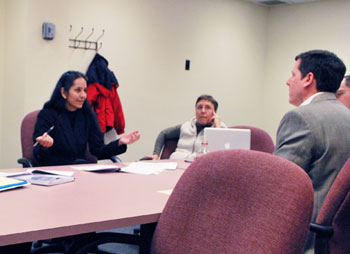
Sumi Kailasapathy (Ward 1) questioned CFO Tom Crawford’s conclusions about the travel and mileage policies at the audit committee’s Jan. 24, 2013 meeting. (Photo by the writer.)
Listed among other relatively minor matters in Rehmann’s report was a note identifying three instances of an employee who had claimed mileage reimbursement despite receiving a vehicle allowance. At a scheduled Dec. 20, 2012 meeting of the audit committee, the dual claims were described by Rehmann’s Mark Kettner as a “double dip.” Those claims were also cited in Kettner’s written report as a violation of city policy.
The Chronicle’s write-up of the auditor’s presentation late last year to the audit committee – which did not achieve a quorum on that occasion – included the result of additional reporting: Mileage claims made by city attorney Stephen Postema caused the auditor to flag the issue in his formal report.
But at the Jan. 24 committee meeting, Kettner revealed that he’d been convinced to change the wording of the note. The new wording will not indicate a “violation” of city policy. At the meeting, however, Kettner indicated that a note about this issue would still be included – with the exact wording yet to be settled. City CFO Tom Crawford’s written response to the auditor’s report includes email messages that show it was Crawford and Postema who made a successful effort to convince Kettner to alter the report’s wording.
The wording of Postema’s employment contract factored into arguments made by Postema and Crawford for a revision to the auditor’s report. When Postema made his reimbursement claims, his contract at that time provided for “travel” expenses in addition to a vehicle allowance. Postema’s vehicle allowance was eliminated late last year, as a result of his annual performance review. Also factoring into the argument for revising the auditor’s note was Crawford’s contention that the city’s written policies don’t provide clear guidance on the question.
However, at the Jan. 24 committee meeting, Sumi Kailasapathy (Ward 1) challenged Crawford on that point. [Kailasapathy was elected to the council in November 2012 – running a campaign that stressed her credentials as a certified public accountant.] She reviewed the logic and specific wording of each of the city’s relevant policies, with particular attention to the meaning of the word “travel” – and reached the conclusion that the mileage reimbursements had not conformed with city policy.
And even though Kettner has agreed to change the wording of the note in his report, Kettner wrote in a Jan. 18 response to Postema and Crawford: “… from a business practices standpoint, our conclusion (with or without the existence of a policy) was it would be illogical and, therefore inappropriate, to make mileage reimbursements to persons having a car allowance.” Kettner’s response also indicates that his conclusion of inappropriateness was not based on a review of Postema’s employment contract.
At the Jan. 24 meeting, Crawford interpreted the fact that he and Kailasapathy reached different conclusions about the appropriateness of the mileage claims as evidence that the written policies didn’t provide clear guidance.
Stephen Kunselman (Ward 3) seemed to reflect the general sentiment of the two other committee members present – Chuck Warpehoski (Ward 5) and Margie Teall (Ward 4) – in concluding that he didn’t think anyone had been trying to “game the system.” Kunselman indicated little enthusiasm for delving into the wording of Postema’s contract or existing city policies. He was more interested in making sure that the relevant policies would be revised and applied in the future – not just for the travel and mileage policies, but for the other issues identified in the auditor’s report.
Kunselman also indicated that he was keen to see the audit committee take a more active, engaged role – throughout the year, not just once a year on the occasion of the auditor’s report. The committee as a group also seemed favorably inclined toward adopting a more proactive approach. The committee’s extended conversation about the relationship of the city’s part-time internal auditor indicated that while the internal auditor would still report to Crawford, the audit committee would be looped into the ongoing issues that emerged throughout the year as they arose – instead of six months after they happened. It could result in meetings of the committee at other times besides the occasion of the annual auditor’s report.
That reflects a transition from the role that the audit committee has played as recently as two years ago. The committee did not meet at all during that year, even to review the FY 2010 auditor’s report – because audit committee chair Stephen Rapundalo declined to call a meeting. Kunselman complained at the time about the lack of a committee meeting. Rapundalo was not re-elected in 2011 – when he had faced Jane Lumm, who received more votes than Rapundalo that November. [Full Story]
Washtenaw & Platt
At Meri Lou Murray Rec Center: One WCC student is taping another WCC student who is costumed as a mustard-slathered frankfurter and pumping iron, as their girlfriends howl. Cameraman explains it to half-dozen amused weight-room regulars: “It’s for a school project. He’s a lean hot dog.”
Ashley & Liberty
Three Ann Arbor “Licensed Limos” parked in tow away-zone with drivers nowhere to be seen. [photo]
A2: Downtown Planning
Writing on her blog, Ann Arbor city councilmember Sabra Briere adds to the conversation about the future of five downtown city-owned parcels – the focus of the Connecting William Street project. She frames the question not in terms conference centers versus parks, but rather in terms of civic uses more generally: “I’d like a real discussion about civic uses downtown – and I’d like us to talk about the best ways we can pay for those uses.” [Source]
City Council Debates Utility Connection Costs
Ann Arbor city council meeting (Jan. 22, 2013): One item on the consent agenda was responsible for extending the city council’s meeting by at least 40 minutes – the annual setting of fixed charges for water main and sanitary sewer improvements. The council chose not to approve the increase that had been calculated by city staff. That left the charges at their current levels – $15,552 and $24,665 for water and sewer, respectively – instead of raising them by just under 3% to $15,967 and $25,370, respectively.

Ann Arbor water main and sanitary sewer fixed charges: 2004 to present. The proposed increase indicated for 2013 was not adopted by the city council at its Jan. 22 meeting.
The charges are due when a single- or two-family property connects to water and sewer for the first time. The charges are paid by either the contractor/developer or the property owner, depending on who makes the request for a connection.
Consent agenda items – a subset of the council’s business – are by definition voted on as a group, but councilmembers can choose to pull out items from the consent agenda for separate discussion.
That’s what happened at the Jan. 22 meeting. After an attempt to postpone the item failed, the council simply chose not to adopt the increases. But councilmembers were split on the question, with Christopher Taylor (Ward 3), Chuck Warpehoski (Ward 5), Mike Anglin (Ward 5) and mayor John Hieftje voting for the increased charges. Arguments against the increase were based on the amount of the increases, their possible impact on the likelihood of infill development in lower-income neighborhoods, and the fairness of charging new connections for depreciation costs.
The other major chunk of the council’s meeting was devoted to a briefing from Washtenaw County sheriff Jerry Clayton on the transition of police dispatch operations for the city to the sheriff’s office – Washtenaw Metro Dispatch (WMD). Highlights of that presentation included benchmark metrics. For example, WMD answers 97% of all calls within 20 seconds (4 rings). Total call processing time – from when the call is received until some unit is dispatched – ranges from 2.2 minutes for robberies to 5.16 minutes for disorderly conduct calls. According to Clayton, over the last six months since operations have been shifted to WMD from Ann Arbor police dispatch, the cost per 911 call has been decreased by more than half – from just under $40 per call to around $16 a call.
The council also established a project planning budget for a sidewalk on a quarter-mile stretch of Newport Road just north of Wines Elementary School. In other business, the council approved establishing a residential parking district off Washtenaw Avenue southeast of the University of Michigan campus, because streets in the neighborhood were being effectively used as a commuter parking lot for students taking the bus further into campus.
The new residential parking district is located in a neighborhood in the vicinity of the Beth Israel Congregation. Beth Israel came up during communications time as Chuck Warpehoski (Ward 5) responded to public commentary critical of him for not yet bringing a resolution to the council table on the topic of Palestinian rights. Warpehoski essentially indicated he would not be contemplating such a resolution as long as demonstrations continue outside Beth Israel on Saturdays during worship services.
Half of the public commentary at the start of the meeting was on the topic of a proposed dog park – in West Park, across the street from the New Hope Baptist Church. The proposal had been expected by supporters to be on the council’s agenda, but it had not been included. So some turned out to urge council to pursue a dog park at that location. Others simply advocated for establishing a centrally-located dog park somewhere in the city.
The decision to pull the item from the agenda had come after the city’s park advisory commission had voted in December to recommend establishing a dog park in the West Park location for a one-year trial period. But subsequently, parks staff and commission leaders were convinced by members of the New Hope congregation not to push the proposal ahead for consideration by the city council. [Full Story]
Main btw Liberty and Huron
S. Fourth near William
Among the pretzel-makers in the basement of Bethlehem United is Jim Lutz, whose family owned the iconic Quality Bakery on Main Street. [photo] He was a good sport when I asked him to autograph my bag of pretzels – because small business owners, past and present, are rock stars! [photo]
Column: Bo’s ‘Sons’ Face Off in Super Bowl
Even those who don’t follow sports probably know the Super Bowl is a week from Sunday. And, for the first time ever, in any major American sport, the opposing head coaches are brothers. More important for Michiganders, they are the Harbaugh brothers, John and Jim, who went to Ann Arbor Pioneer High School. So, you’ll probably start to hear lots of stories from the folks who met them along the way.
Well, count me in.
Their dad, Jack, coached under Michigan’s Bo Schembechler in the ’70s. His oldest son John played football at Pioneer High and Miami of Ohio, then worked his way up the ladder until he became the head coach of the Baltimore Ravens in 2008. He told the Washington Post he’s based his coaching philosophy on Bo’s coaching philosophy.
John’s younger brother Jim has had a complicated relationship with Michigan, but not with Bo. Jim is my age, and when we were 12 he was Michigan’s ball boy – which made all of us envious. I played against him in baseball, and with him in hockey. That was my best sport, and I was just barely better than he was – that’s my claim, anyway – and hockey was his fourth sport, which he played on the side during basketball season. Guess which one of us became a sports writer? [Full Story]
AADL Acts on Communications, Facilities
Ann Arbor District Library board meeting (Jan. 21, 2013): Efforts to develop a communications plan and to review the needs of all library facilities were among the items addressed at the library board’s first meeting of 2013.
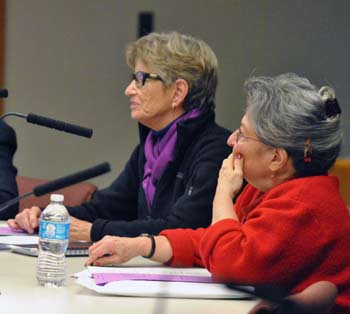
From left: Prue Rosenthal, the new president of the Ann Arbor District Library board, and board member Barbara Murphy. The seven-member board elected new officers at its Jan. 21, 2013 meeting. (Photos by the writer.)
The board voted unanimously to create two special committees – for facilities and communications. The efforts can be tied to a defeated bond proposal on the Nov. 6 ballot, which the AADL board had hoped would fund a new downtown library.
Both topics were touched on during public commentary, too. Two local architects – Sahba Laal and George Kachadoorian – told the board they’ve prepared a proposal for renovating and perhaps adding to the downtown library building. They hope to present their ideas at a future board meeting. Also during public commentary, Lou Glorie urged the board to consider moving its meeting dates, which typically fall on the same evening as Ann Arbor city council meetings. She also suggested that the meetings be recorded for viewing on Community Television Network (CTN) – an idea that the majority of board members rejected when Nancy Kaplan proposed it nearly two years ago.
In contrast, Kaplan’s most recent proposal – to hold three board meetings this year at library branches, rather than at the downtown location – won unanimous support from the board. The change is intended to make it easier for the public to attend, and to showcase the branches. Those branch meetings will be held at: (1) the Traverwood branch at 3333 Traverwood Drive, at the intersection with Huron Parkway (June 17); (2) the Pittsfield branch at 2359 Oak Valley Drive (July 15); and the Malletts Creek branch at 3090 E. Eisenhower Parkway, east of Stone School Road (Sept. 16).
The Jan. 21 meeting included a swearing-in ceremony – officiated by Libby Hines, chief judge of the 15th District Court – for the four AADL board incumbents who were re-elected on Nov. 6, 2012: Nancy Kaplan, Margaret Leary, Rebecca Head and Prue Rosenthal. The seven-member board also held officer elections. Prue Rosenthal was unanimously elected president. Other officers are Jan Barney Newman (vice president); Nancy Kaplan (treasurer); and Rebecca Head (secretary).
Several members of the Protect Our Libraries group attended the Jan. 21 meeting. Formed in 2012 to oppose the AADL’s bond proposal for a new downtown library, the group subsequently organized as a political action committee (PAC). Kathy Griswold, who launched Protect Our Libraries, was among those present at the board meeting – along with Bob Rorke, who previously served on the Ann Arbor Public Schools board of education with Griswold. Griswold told The Chronicle that the PAC is hiring Rorke to conduct a financial analysis of the AADL. [Full Story]
Forsythe Middle School
Halftime at the 8th grade Forsythe-Clague basketball game. Forsythe losing 28-11. [photo]
AAPS Starts Year with Extended Agenda Talk
Ann Arbor Public Schools (AAPS) Annual Organizational Meeting (Jan. 16, 2013): Matters of organization dominated the board’s discussion at its annual organizational meeting.
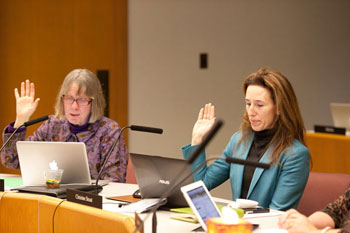
President Deb Mexicotte and vice president Christine Stead are sworn in as board officers. (Photos by the writer.)
The agenda planning process was at the heart of the conversation, as was the issue of committee restructuring. The board also observed a moment of silence for Scarlett Middle School math teacher Scott Turner, who passed away Monday, Jan. 14, 2013.
The board launched into its first meeting of the new year, beginning with trustee Deb Mexicotte taking her oath of office after winning re-election for a four-year term this past November.
The board’s first order of business was to elect its officers. All four board officer positions were uncontested and were approved unanimously. Mexicotte was re-elected president; Christine Stead, vice-president; Andy Thomas, secretary; and Glenn Nelson was elected as treasurer.
The four officers took their oaths of office, and Mexicotte reappointed Simone Lightfoot as parliamentarian.
After establishing that the board would review the agenda for future meetings at the conclusion of each board meeting, and that agenda items would need a majority vote to be added to a future agenda, the board voted on several possible future agenda topics.
The topic of semester versus trimester scheduling at Skyline did not make it onto a future agenda; but the board is expecting a recommendation from administration on that topic in February. A review of school security will be placed on a board agenda sometime this academic year. Budget forums will be scheduled in the first half of the year, after the administration receives more direction from the board. The superintendent’s performance evaluation will take place in February and March. And options for the future of the Roberto Clemente Development Center will be scheduled for February or March. [Full Story]
Huron & Fifth Avenue
Accident with two badly smashed cars, a light pole, a big mess of broken glass and backed-up traffic.
A2: Rose Martin
Peace Neighborhood Center of Ann Arbor informs the community about the death of Rose Martin, the nonprofit’s founder and first executive director, who died on Jan. 22: “She was not afraid of life’s challenges in her pursuit of what was right. One could not accuse her of being a wilting flower. She was one Rose Blooming, a voice of compassion and a hero to a great many individuals throughout Washtenaw County and abroad. She was an inspiration and it is our distinct pleasure to be a part of her legacy, the Peace Neighborhood Center Family. She will be missed.” [Source]
Ann Arbor OKs Another Parking Permit Area
A new residential parking district in Ann Arbor has been established in a neighborhood about a mile southeast of the University of Michigan campus, off Washtenaw Avenue.
According to the staff memo accompanying the Ann Arbor city council’s agenda item, the rationale for the district is that residents in the area have “extreme parking problems due to the students parking in their neighborhood and then bussing into campus.” Sixty percent of residents in the area signed a petition requesting that the district be established.
Signs for each of the 12 block … [Full Story]
Ann Arbor DDA to Pay City to Fix Sidewalks
For the next two years, many sidewalks within the geographic district of Ann Arbor’s Downtown Development Authority (DDA) will be repaired by the city of Ann Arbor – using funds captured by the DDA from the city’s sidewalk repair millage under its standard tax increment finance (TIF) mechanism.
Voters approved the 1/8 mill sidewalk repair millage in November 2011. The city council resolution placing the question on the ballot that year excluded certain properties inside the DDA district – those that are not one- and two-family houses – from the city’s sidewalk repair program that is funded with the millage proceeds.
The council subsequently enacted an ordinance, on June 4, 2012, that assigns responsibility for sidewalk maintenance and repair to the … [Full Story]
Newport Sidewalk Planning Budget Gets OK
A quarter mile stretch of Newport Road – from Wines Elementary School northward to Riverwood – may see construction of a public sidewalk by the summer of 2014. The Ann Arbor city council approved a $15,000 budget to come up with a preliminary design and cost estimates, evaluate different funding scenarios, and gather additional public feedback on the project. The vote to allocate the $15,000 came at the city council’s Jan. 22, 2013 meeting.
The project has a background that dates back at least to Nov. 15, 2011, when the city held the first of two meetings in response to requests from residents who live in the neighborhood to consider construction of a safe walking path to the school.
The staff memo … [Full Story]
Limited Geddes Area Gets Initial Rezoning OK
Rezoning of six parcels in the northeast Ann Arbor Hills neighborhood has been given initial approval by the Ann Arbor city council. The sites are to be rezoned from R1B to R1C. Both are types of single-family dwelling districts. The locations are 2014 Geddes Ave.; 2024 Geddes Ave.; 520 Onondaga St.; 2025 Seneca Ave.; 2023 Seneca Ave.; and 2019 Seneca Ave. [.jpg aerial view of parcels] These are six parcels in a block of 10 sites – the other four sites are already zoned R1C.
The vote by the council came at its Jan. 22, 2013 meeting. Because a change to zoning is a change to the city’s set of ordinances, to be enacted it will require a second vote … [Full Story]
Graham Gets Environmental Reappointment
Christopher Graham has been reappointed to serve on the city of Ann Arbor’s environmental commission. The vote by the city council came at the council’s Jan. 22, 2013 meeting.
Graham was initially appointed in 2006 and has served two three-year terms on the commission. Graham is also a member of the executive committee of the Michigan Environmental Council.
This brief was filed from the city council’s chambers on the second floor of city hall, located at 301 E. Huron. A more detailed report will follow: [link]




